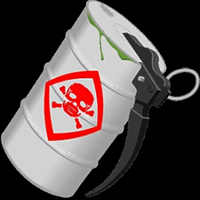
|
From Draft NOtices, January-February 2001 THE U.S. MILITARY’S SILENT ASSAULT ON COMMUNITIES — Ray Wolf |

|
|||
|
Imagine that communities all over a country are suffering from a multitude of war-related health problems. Imagine a community where girls as young as 13 years old are dying from ovarian cancer caused by military pollution. Imagine a community where 100% of the children are born contaminated by military toxic waste. Imagine a community where over 90% of adults and nearly 80% of children have multiple illnesses — including neurological disorders, respiratory problems, and lead contamination. Where would you guess these people live? Iraq? Yugoslavia? The former Soviet Union? No, they live in the United States, and they are not the direct victims of a military attack. Instead, they are the victims of the U.S. government’s decades-long obsession with war preparations. They are the victims of contamination from U.S. military bases that has infiltrated and all but destroyed their communities. Predictably, the military denies responsibility. But now the residents have proof through independent testing and university studies, and they are fighting back. Community activists from North America, the Caribbean and Japan met in early November at the Contaminated Bases Conference, held at the Island Palms Hotel in San Diego, to share information and to coordinate their efforts to force the United States military to take responsibility for cleaning up its toxic waste. In addition to sharing their experiences and strategies for combating military pollution in their communities, the activists held a spirited rally across the street from the hotel. A "People’s Congressional Hearing" with Representative Bob Filner (D-San Diego) followed the rally. In his opening statements, Filner said he wished he were a member of the majority party in Congress so that a "real" Congressional hearing could be held on the issue of military pollution poisoning communities. However, he said, "Perhaps it’s better that we hear from the people first, anyway." About 100 people attended the hearing and about 20 of those testified. Although the hearing was publicized and open to anyone, no Department of Defense representatives attended the hearing. Some of the most compelling testimony presented came from Janet Daniels, an Athabascan grandmother from Alaska. Daniels told Filner that toxic contamination from over 700 active and former military sites in Alaska has poisoned the native people’s food and water sources, leading to excessively high levels of cancer and other diseases in their communities. "The same people who are supposed to be defending us are killing us," Daniels said. A Tewa Indian tribe member, Gilbert Sanchez, who lives near the Los Alamos National Laboratory in New Mexico, told Filner that "national security" is a phrase that should refer to the protection of the American people. "National security should not mean that the military is secure from the laws and regulations that are meant to protect the well-being of Americans," he said. Sanchez also suggested to Filner that the way to settle the Presidential election (still unresolved at the time) would be to have the Bureau of Indian Affairs make the decision, since they have extensive experience deciding Native American elections. Also present at the hearing was Robert Rabin from the Committee for the Rescue and Development of Vieques, a Puerto Rican island with about 9,000 residents. Rabin asked Filner to assist the citizens of Vieques in their efforts to remove the U.S. Navy base from their island, and to require the Navy to properly clean up its toxic mess (see Draft NOtices, July-August 1999 and July-August 2000). Earlier in the conference, Rabin urged the participants to understand that "the problem of military pollution is not just a scientific and political issue. It is an immediate case of life and death." At the conclusion of the hearing, Filner said he plans to introduce a bill in the U.S. House of Representatives that would lead to laws requiring the "Department of Defense and all other defense-related agencies of the United States . . . to comply with all federal and state environmental laws designed to protect the health and safety of the public or environment to the same extent as all other entities subject to such law." No time frame was given for the introduction of the bill, but Filner said that he would work on gathering support from the American people. The conference and hearing were sponsored by the Military Toxics Project (MTP), a ten-year-old organization that was founded to unite activists, organizations, and communities in campaigns for the cleanup of military pollution. MTP is a network of grassroots community groups, environmental justice organizations, peace organizations, veterans groups, labor groups, and technical advisors. Two San Diego-based sponsors were the Environmental Health Coalition (EHC) and the Peace Resource Center (PRC). The EHC, founded in 1980, promotes the cleanup of toxic pollution in the San Diego area. The PRC provides resources and acts as a clearing house for information on peace and social justice issues. As a result of the coordinated efforts of the community activists that participated in the conference, the Military Toxics Project has adopted the "Sovereign Immunity Campaign" as its 2001 national campaign. The campaign will focus on ways to remove the military’s immunity from environmental regulations, with the ultimate goal of making the military accountable for its pollution and responsible for cleaning up its toxic waste. Several different strategies will be used, including gathering support for Filner’s House of Representatives bill, the "Military Environmental Responsibility Act." For more information on the MTP campaign, or to offer your support, contact them at P.O. Box 558, Lewiston, ME 04243-0558, or visit their Web site at http://www.miltoxproj.org. This article is from Draft NOtices, the newsletter of the Committee Opposed to Militarism and the Draft (www.comdsd.org). |
||||